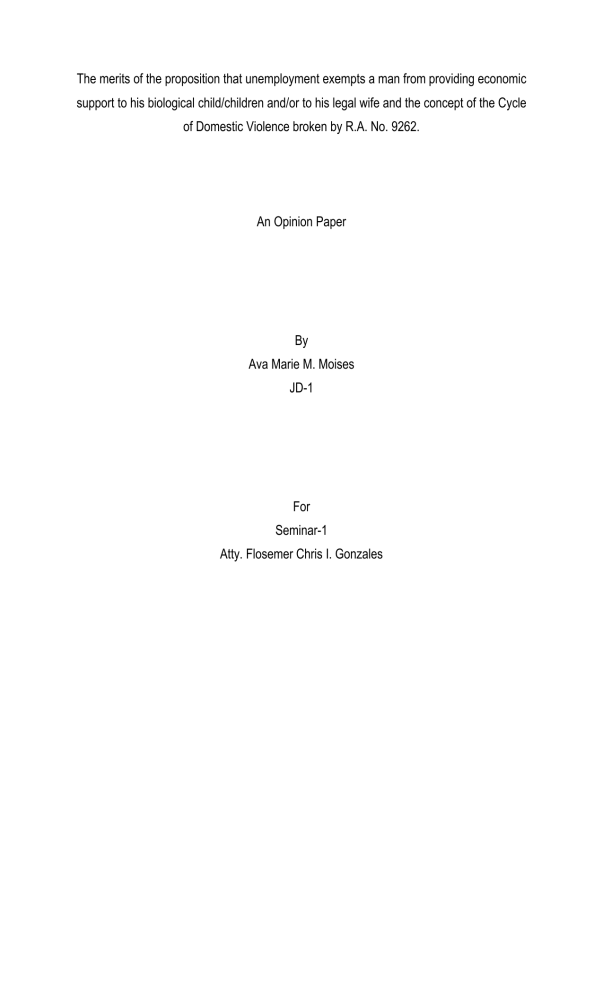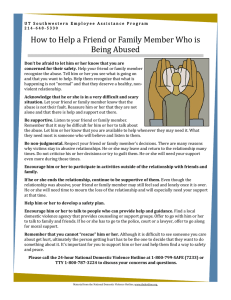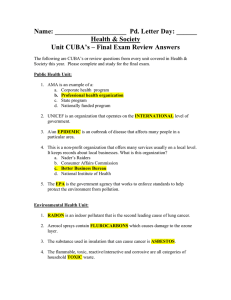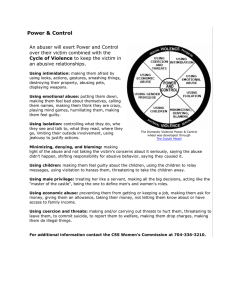
The merits of the proposition that unemployment exempts a man from providing economic support to his biological child/children and/or to his legal wife and the concept of the Cycle of Domestic Violence broken by R.A. No. 9262. An Opinion Paper By Ava Marie M. Moises JD-1 For Seminar-1 Atty. Flosemer Chris I. Gonzales It is expected from a father, as the head of the family, that he asupports his wife and his children. It is the norm, it is expected, and it is what the law states. While it is the mother’s primary duty to take care of the children and household, the father’s duty is to be the breadwinner, to provide for his family’s needs and if he can. This means that it is the burden of the father to look for a means to earn to be able to support the expenses of the household, his wife’s basic needs and his children’s education; and if his resources allows, to provide for his family’s wants. As is stated in the Philippine Law, under R.A. 9262, the law puts pressure on a father to provide for his child by threatening him with criminal action if he does not provide support. Section 5 e (2) in particular, this section discusses Child Support as Depriving or threatening to deprive the woman or her children of financial support legally due to her or her family, or deliberately providing the woman’s children insufficient financial support. Meanwhile, Sec 6 (c) discusses the penalty as punishable by prison correctional or jail. However, a father’s support for his family also depends on his capacity as an earner. The court considers his net worth, his investments, and his job with regards to how much he should give to his family since support will be drawn from these sources. If not however, there is no possible way that support can be received even if there is a court order for it. One major factor that plays a great part in issues and problems regarding child support and support for the wife is the inability of the father to earn. Take for example the situation that Filipinos face today because of the pandemic. A lot of father’s lost their jobs because they were terminateda from their companies. Considering that the father has no source of income, it is understandable that he would not be able to give support for his children unless of course if he finds a replacement for the job he lost. Another example is that if a father is illiterate and only earns a meager amount that is not even sufficient to support his own needs, then he should not be compelled to give an amount for support which is more than he could afford. Therefore, even if the father has received court order, if he has no job, has no income, has no means to provide for his family because of physical incapacity, it does not mean that support will automatically be sent. There has to be always some humane consideration as to the situation of the giver. However, if there is a consideration given to the father who is supposed to support his children, he should also persevere to earn and give support if he is capable working. Filipinos nowadays have become more resilient with regards to the difficulties we face, “madiskarte” is the term for it. A father may opt for other sideline jobs for him to be able to provide support for his children. It is also proven by other fathers who do 2 or more jobs just so they could earn sufficiently for the household’s expenses. Another issue that presented itself even more during this pandemic is the Cycle of domestic violence. Domestic violence as it is defined, is the abuse within a domestic setting, meaning in a marriage or cohabitation. Domestic Violence is not only limited to physical abuse. It may mean as emotional, psychological, and even economic abuse. When people think of domestic abuse, they often focus on domestic violence. But domestic abuse includes any attempt by one person in an intimate relationship or marriage to dominate and control the other. Domestic violence and abuse are used for one purpose and one purpose only: to gain and maintain total control over you. An abuser doesn’t “play fair.” An abuser uses fear, guilt, shame, and intimidation to wear you down and keep you under their thumb. Age, nationality, status in life, even power, these things do not exempt any woman or child from being abused. Family members, acquaintances, and even strangers, literally anyone could be guilty of doing such crime. Mentally, physically, economically, and sexually, one, two, or even all of these abuses could be experienced by any woman or child. At home, in a public place, in a public transportation, at work, and even at school, no place is safe from abusive perpetrators. All forms of abuse against women and their children have been present in the a throughout the ages and it has been a problem that has long gone unsolved for many. And in 2003, 24% of the women victims actually believed that the actions of their husbands, boyfriends, and live-in partners were justifiable. Thus, Zonta District 17 accepts the challenge to address the need to educate women of their rights. Domestic violence and abuse can happen to anyone; it does not discriminate. Abuse happens within heterosexual relationships and in same-sex partnerships. It occurs within all age ranges, ethnic backgrounds, and economic levels. Domestic abuse often escalates from threats and verbal assault to violence. And while physical injury may pose the most obvious danger, the emotional and psychological consequences of domestic abuse are also severe. Emotionally abusive relationships can destroy your self-worth, lead to anxiety and depression, and make you feel helpless and alone. No one should have to endure this kind of pain—and your first step to breaking free is recognizing that your relationship is abusive. Add another public health crisis to the toll of the new coronavirus: Mounting data suggests that domestic abuse is acting like an opportunistic infection, flourishing in the conditions created by the pandemic. Now, with families in lockdown worldwide, leaving the government trying to address a crisis that experts say they should have seen coming. Since the nationwide quarantine was implemented by the government, the record of domestic violence ballooned. Having to stay at home without sufficient sources for less earning families has proven to be a reason for domestic violence to surge. As cities have gone into lockdown to stop the spread of coronavirus, the mass efforts to save lives have put one vulnerable group more at risk. Women and children who live with domestic violence have no escape from their abusers during quarantine, activists and survivors say they are already seeing an alarming rise in abuse. The stereotype of domestic violence is a man beating a woman in an outof-control fit of rage. In reality, abusive relationships are much more complex. Although abusers are usually men, there are women who use violence against their partners as well. A thorough review of the research indicates that women tend to use violence in self-defense; men tend to use violence to gain or keep control over their partners.[2] Domestic violence often follows a repeating cycle within each relationship. Not every abusive relationship follows this pattern, but many survivors describe their relationships in this way: Tension building Phase, Abusive Incident, and Honeymoon Phase, During the tension building phase, when tension builds in the relationship, victims may feel like they are “walking on eggshells” around the abuser. This phase can last for a few hours or for months, or anything in between. The longer it lasts, the more inevitable the blow-up can start to feel, even if the victim can’t be sure exactly what will be the straw that breaks the camel’s back. The abusive incident usually occurs when the tension finally breaks. This can play out in many different ways. Usually, this part of the cycle is when the abuser physically lashes out at the victim. The abuser may hit, rape or try to rape the victim. In relationships where the abuse is primarily psychological, the abuser may suddenly deny the victim access to basic necessities (by changing the locks on the house or cutting off access to a shared checking account, for example), calling the victim humiliating names, or making threats of violence. During the honeymoon phase, the abuser may apologize, buy gifts, or be extra affectionate to “make up” for the abuse. Many will promise to change, promise to stop abusing, or promise that it will never happen again. These assurances are intended to persuade the survivor to stay in the relationship. Not all abusive relationships have a honeymoon phase. For some, the abusive incident is immediately followed by increasing tension before the next incident. Once the honeymoon phase is over, the tension building phase begins again, and the comforting promises the abuser made will be broken. In most cases, the abuser will not change, and the only way to end the abuse is for the victim to end the relationship. Unfortunately, the most dangerous time in an abusive relationship is when the victim tries to leave. That is when he or she is most likely to be seriously injured or even killed by the abuser. The implementation of the Republic Act 9262 or The Anti-Violence Against Women and Their Children Act paved a way into breaking the cycle of domestic violence. Thru this act, women and children gained the strength to fight for their right against physical, emotional, social, mental, and economical violence. What has before been deemed as a crime that has no solution now became solvable. Well trained social workers, police officers, even barangay officials are of big help to these women and children whose lives are hell within their homes because of the violence inflicted to them by their own husbands and fathers. Families who are abuse can even fight for economic support which is lawfully stated under this act. Women and children who are ridiculed by their own family members now have the power to put a stop to this kind of violence. Even girlfriends and common law wives who had past sexual relationships or dating relationships with perpetrators are protected under this act. This act protects them from battery, verbal abuse, even stalking. This act has even empowered relatives, concerned citizens, social workers, therapists, lawyers, and even barangay officials to file a complaint if they have knowledge of such violence since under Republic Act 9262, violence against women and their children is considered as a public crime. This allows the latter to file a case against the perpetrator in behalf of the victims. With RA 9262, women victims’ grievances can now be aired and have the full force of the law. What was supposedly perceived as a private family problem is now a public criminal act. Republic Act 9262 is a blessing to women and their children since it is a law that aims to give protection to women and their children against violence committed to them by past or present husbands, boyfriends, or live-in partners. An Act secure their rights from being abused by those who are close to them, those whom they trust. The Anti-Violence Against Women and Their Children Act of 2004 has been significant in the protection of the rights of women and children against gender-based violence. It is a very aiding response to the need to address the violence women and children experience due to unequal power relations especially those who are victims of the Cycle of Domestic Violence. SOURCES: https://lawyerphilippines.org/2018/10/07/2018-guide-to-child-support-inphilippine-law/ https://attorney.org.ph/legal-news/319-demand-for-child-support-from-father-withno-source-of-income https://www.chanrobles.com/executiveorderno209.htm#.X5FBZogzYdU https://www.theguardian.com/society/2020/mar/28/lockdowns-world-risedomestic-violence https://www.nytimes.com/2020/04/06/world/coronavirus-domestic-violence.html https://www.americanprogress.org/issues/women/reports/2020/08/10/489068/ens uring-domestic-violence-survivors-safety/ https://www.helpguide.org/articles/abuse/domestic-violence-and-abuse.html https://www.nytimes.com/2020/04/06/world/coronavirus-domestic-violence.html



